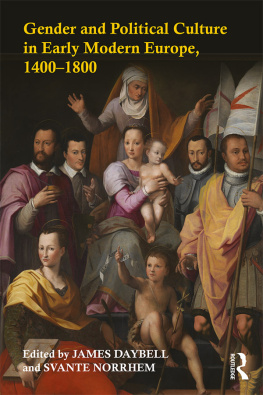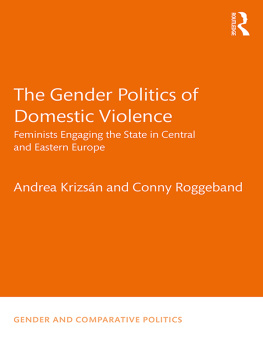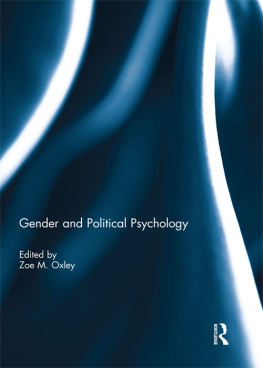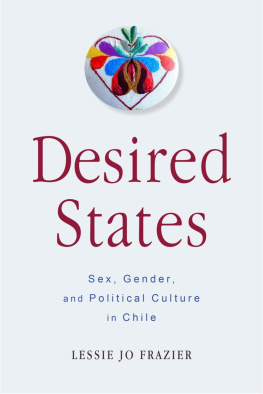2000 The University of North Carolina Press
All rights reserved
Manufactured in the United States of America
Designed by Heidi Perov
Set in Joanna
by Keystone Typesetting, Inc.
The paper in this book meets the guidelines for permanence and durability of the Committee on Production Guidelines for Book Longevity of the Council on Library Resources.
Library of Congress Cataloging-in-Publication Data
Rosemblatt, Karin Alejandra.
Gendered compromises : political cultures and the state in Chile, 19201950 / Karin Alejandra Rosemblatt.
p. cm.
Includes bibliographical references and index.
ISBN 0-8078-2567-0 (cloth: alk. paper)
ISBN0-8078-4881-6 (pbk.: alk. paper)
1. Sex rolePolitical aspectsChileHistory20th century. 2. ChilePolitics and government19201970. I. Title.
HQ 1075.5. C 5 R 67 2000
305.3 0983dc21
00-039249
04 03 02 01 00 5 4 3 2 1
Portions of this work appear in somewhat different form in Karin Alejandra Rosemblatt, Domesticating Men: State Building and Class Compromise in Popular-Front Chile, in Hidden Histories of Gender and the State in Latin America, edited by Elizabeth Dore and Maxine Molyneux (Durham, N.C.: Duke University Press, 2000), 26290.
Preface
During a July 1999 trip to Chile, I contacted some of the activist women I had interviewed for this book in 1993 and 1994. I wanted to show them what I had made of the stories they had told me. I worried: Would they remember me? Would they disagree with what I had written? Would they be bothered by the more personal information I had chosen to include? Thankfully, they welcomed me, and, displaying the subversive edge I remembered, they reaffirmed even controversial disclosures regarding birth control, sexuality, and lesbianism.
These extraordinarily unconventional women, who had all been active in political or professional circles during the popular-front years of the 1930s and 1940s, nevertheless reminded me that their stories were and are very much their own, and that this book is very much mine. It was not that I had gotten anything wrong. Several smiled to themselves as I read back to them expressions and stories that were undoubtedly and idiosyncratically theirs. I have used those stories here to weave an account of feminist, socialist, and labor politics in the construction of the popular-front state, but for them the tales have different and more personal meanings. As I read to them what I had written, they added details, retold the old anecdotes, and remembered new ones. My account has not silenced theirs.
In some cases, we disagreed. Tomy Romeo practiced the constructive criticism she had learned as a feminist activist. She hoped, she said glancing at the overstuffed box that held my manuscript, that my book would not be too long or overly detailed. And she trusted that I would not burden the text with too many of those useless, hard-to-read endnotes. I knew I would disappoint.
Elena Varela, the social worker whose story begins this book, had a deeper difference of opinion. My insistence that intellectual practices were intricately related to politics was not only misguided, she told me, but politically dangerous. The dedication of professionals like herself to the poor and to enhanced state services was, she maintained, simply humanitarian, based on technical considerations and not on politics. To portray it as linked to the Left was to bias people against it unnecessarily. I tried to convince her otherwise.
If professional practices had been so divorced from politics, I pointed out, the military and the Right would not have been so insistent on destroying state services and the universities when they took power in 1973. An hour later, Varela and I still disagreed about the meaning of the professional vocation that I had studied and she had lived. This book provides my version. There are others.
This book is mine in other ways as well: it is at least in part the attempt of a chilena who grew up in the United States to understand something more about what it means to be Chilean. Hence the books focus on national identity. My questions are also an attempt to understand my participation in both the Chilean Left and Chilean feminism. For someone who grew up in the horrific aftermath of Salvador Allendes Popular Unity and among so many political refugees, it is, perhaps, inevitable that socialism was and continues to be a point of reference, a ground. The anger of the post-1973 years have fueled this work. The Chilean feminist movement provided a home, a challenging home, during the years I spent in Chile, first in 198788 and then in 199194. My participation in that movement allowed me to experience firsthand the difficulties of cross-class organizing among women. It also gave me a deep sense of the enduring strains between feminism and the Left and of the complex forces that still neutralize feminisms more radical demands.
In the years it has taken me to research and write this book, I have benefited from the help of numerous collaborators and co-conspirators who have shaped my views of intellectual life, political activism, and family. The men and women I interviewed in preparing this work provided not only crucial information and viewpoints but, more importantly, inspiration. I am grateful to them for the time they spent with me and, even more, for their rich, defiant lives. Friends, family, and colleagues in Chile have given me a lasting attachment to the place and remind me of the relevance of my work. For their intellectual guidance and companionship, I would like to thank Alicia Frohman, Lorena Godoy, Toms Moulian, Julio Pinto, Isabel Torres, and Soledad Zrate. For their long-lasting friendship and complicity, Sabrina Beltrn, Isabel Crcarmo, Mnica Gajardo, Lilian Letelier, Lorena Nez, Vernica Oxman, Loreto Palacios, and Carola Perales. And for always making me feel welcome and providing me a warm place to stay on my numerous trips to Chile, my Chilean family: Mara Rosa Bono, Rebecca Katz, Natalia Mehta, Jorge Parada, Isabel Rosemblatt, Mariana Rosemblatt, Oscar Rosemblatt, Mara Silber, and Albertina Valderrama. I am saddened that Oscar Rosemblatt did not live to see this book and that Rebecca Katz is unable to appreciate it.
My intellectual debt to my teachers at the University of Wisconsin-Madison is, I think, obvious. What may be less apparent is their dedication. Florencia Mallon, Francisco Scarano, and Steve J. Stern not only read and provided detailed comments on what was an excruciatingly long dissertation but also took the time to read versions of this book and provide encouragement. Florencia has also been a careful mentor and a good friend. I would never have gotten to the University of Wisconsin had it not been for Marysa Navarro and Leo Spitzer, who interested me in history while I was still an undergraduate.
For me, the best part of being an academic has been the friendships I have made along the way. At the University of Wisconsin and since, I have shared intellectual excitement, politics, and good times with Nancy Appelbaum, Sarah Chambers, Deb Coltey, Blenda Femenas, Eileen Findlay, Roger Kittleson, Patrick McNamara, Anne Macpherson, Seemin Qayum, Ren Reeves, Sinclair Thomson, and Susan Traverso. I have also had the luck of working with a smart and affable bunch of Chileanists, including Lisa Baldez, Patrick Barrett, Liz Hutchison, Margaret Power, and Heidi Tinsman. Corinne Pernet and I have had so many conservations about Chilean feminism that it has often been hard to tell where her ideas end and mine begin. Tom Klubocks incisive and compelling work on Chilean labor has profoundly influenced this work. Corinne and Tom have both been models of generosity. Pablo Silva amiably and competently answered my pesky questions regarding the Chilean middle class. Marisol de la Cadena helped me understand the dynamics of race.





